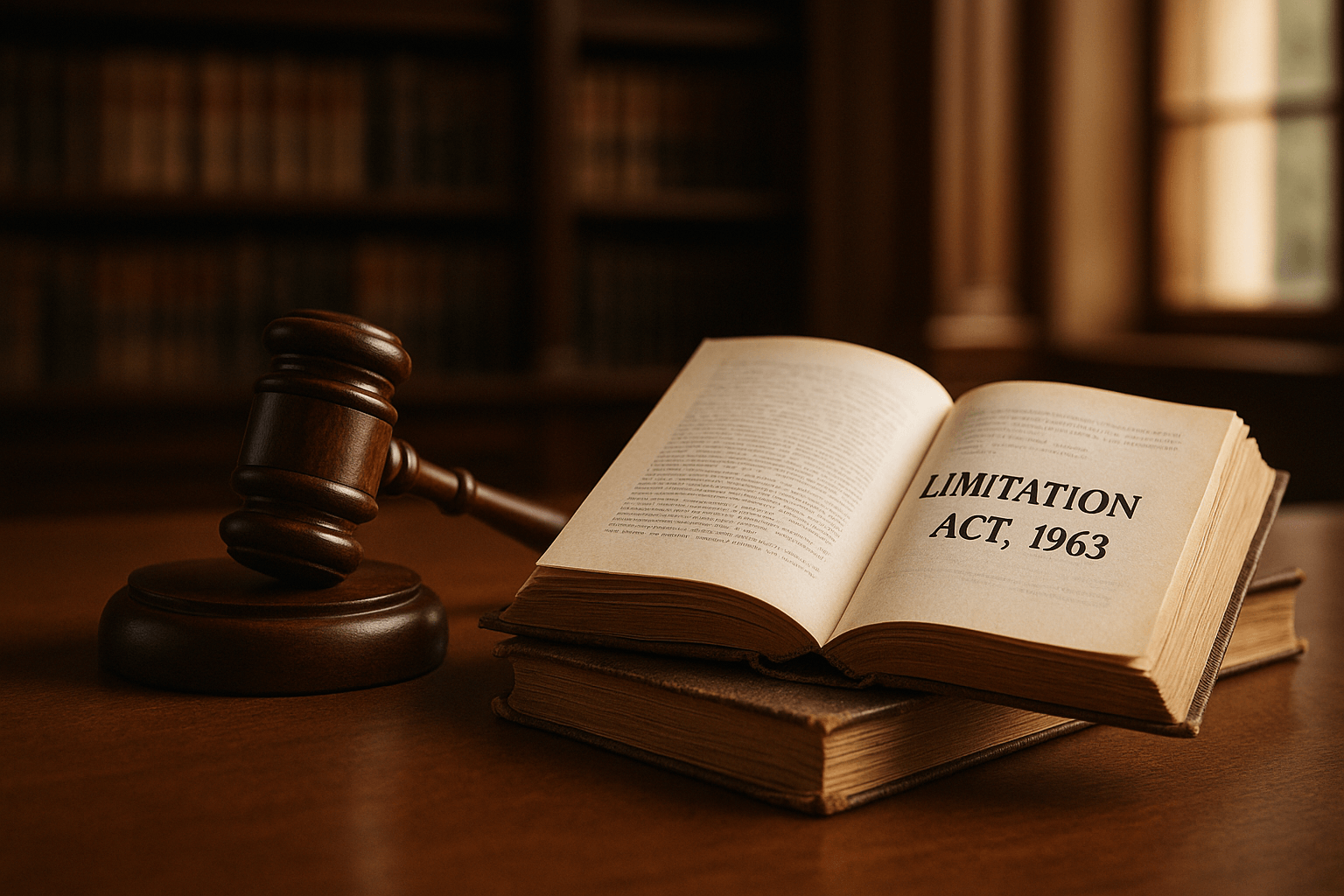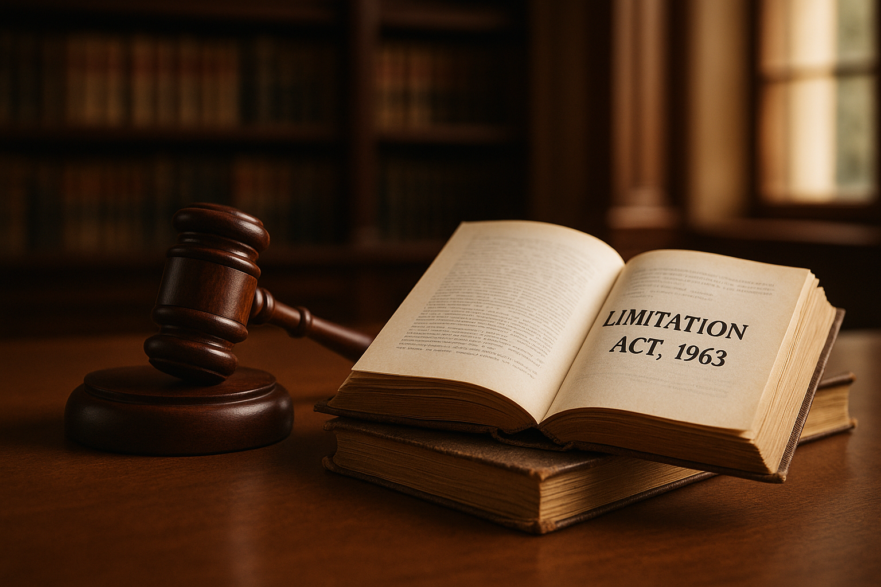
⚖️ LIMITATION ACT ⚖️
Principles behind the Limitation Act
- Those who go to sleep on their claims should not be assisted by Courts in recovering their property.
- There shall be an end of these matters and there shall be protection against stale demands.
Case: R.B. Policies at Lloyd’s v. Butler [1949 KBD]
Preparation for RJS, DJS, PCS (J) and other Judicial Service Exams
LIMITATION ACT EXPLAINED
The Limitation Act is an important component of any and every Judicial Service exam in the country. Its thorough knowledge is a must for all aspirants of RJS, DJS, PCS (J) and every other Judicial Service exam. To help such aspirants, DELHI LAW ACADEMY JAIPUR has launched a series of study material modules on all important aspects of this important part of their syllabus:
Notes by DLA on the Law of Limitation
The object of the law of limitation:
The Limitation Act has been called by great judges as an act of peace. It is based on the premise that “long dormant claims have often more of cruelty than justice in them.”
Policy of Limitation Acts: Courts have expressed at least three differing reasons supporting the existence of statutes of limitation:
- Long dormant claims have more of cruelty than justice in them.
- A defendant might have lost the evidence to disprove a stale claim.
- Persons with good causes of action should pursue them with reasonable diligence.
The object of the law of limitation is to prevent disturbance or deprivation of what may have been acquired in equity and justice by long enjoyment or what may have been lost by a party’s own inaction, negligence, or laches.
The law is meant, inter alia, to protect persons who had paid their debts, but from length of time had lost or destroyed the proof of payment.
Principles behind the Act:
- Those who go to sleep on their claims should not be assisted by Courts in recovering their property.
- There shall be an end of these matters and there shall be protection against stale demands.
- The Limitation Act is an act of peace.
Source: R.B. Policies at Lloyd’s v. Butler [1949 KBD]
“Period of Limitation” means:
- The period of limitation prescribed for any suit, appeal or application by the Schedule.
Some representative illustrations from the Schedule:
- No. 65: For possession of immovable property based on title — 12 years — When possession of defendant becomes adverse to plaintiff.
- No. 21: For money lent under agreement payable on demand — 3 years — When loan is made.
- No. 113: Any suit for which no period of limitation is provided elsewhere — 3 years — When right to sue accrues.
- No. 114: Appeal from an order of acquittal (u/s 417(1)(2) CrPC 1898) — 90 days — From date of order appealed.
- No. 116: Under CPC 1908 to High Court from any decree/order — 90 days — From date of decree/order.
“Prescribed Period” means:
- The period of limitation computed in accordance with provisions of this Act.
PART II – LIMITATION OF SUITS, APPEALS AND APPLICATIONS
Bar of Limitation (Section 3(1))
- Every suit, appeal or application instituted after the prescribed period shall be dismissed, although limitation has not been set up as defence.
- The rules of limitation are not meant to destroy the rights of the parties. Section 3 only bars the remedy, not the right.
- The right to debt continues to exist even when the remedy is barred by limitation.
- The debt does not cease to exist; only the judicial remedy is lost.
- Creditors can adjust time-barred debts through payments or securities in their possession.
- Exception: Under Section 27, when a suit for possession becomes barred, the right to property itself is destroyed.
Questions & Case Discussion
Q: When does the cause of action accrue?
Ans: A cause of action cannot accrue unless there is a person in existence capable of suing and another person who can be sued.
Q: Is it to be said that because the person to be sued is not traceable or known, he is not in existence and cannot be sued?
Ans: No. If the thief had been traceable, he could have been sued. It cannot be said that there was no person in existence who could have been sued.
Q: Can it be said that ignorance of the plaintiff regarding the person who committed the conversion prevents the accrual of cause of action?
Ans: No. It would lead to absurd results if someone, after 50 years, could bring action for recovery merely because he did not know who the thief was.
Source: R.B. Policies at Lloyd’s v. Butler [1949 KBD]
📚 Continue Your Limitation Act Preparation
Don’t stop here! Strengthen your knowledge of the Limitation Act with our other fully solved tests:
📘 Free Study Material for Judiciary Aspirants!
Download our FREE study material prepared by Delhi Law Academy’s expert faculty.
❓ Frequently Asked Questions on the Limitation Act, 1963
⏳ What is the main object of the Limitation Act, 1963?
The Limitation Act aims to prevent disturbance of rights acquired through long enjoyment and to discourage stale claims.
It ensures that those who sleep on their rights cannot later seek the court’s assistance, thereby promoting legal certainty and fairness.
⚖️ Does the Limitation Act destroy the right itself or only bar the remedy?
Section 3 of the Limitation Act only bars the remedy, not the right.
The underlying right continues to exist, but the person can no longer enforce it through a court of law.
However, under Section 27, in suits for possession of property, both the right and remedy are extinguished.
📜 What does the term “period of limitation” mean?
“Period of limitation” refers to the specific duration prescribed in the Schedule of the Limitation Act
for filing a suit, appeal, or application. For example, suits for possession based on title have a limitation period of 12 years.
🧾 Can the Court take up a case after the limitation period has expired?
No 🚫. Section 3(1) mandates that every suit, appeal, or application filed after the prescribed period must be dismissed,
even if the defence of limitation is not raised by the defendant. Courts are bound by this statutory bar.
🕰️ What happens when a debt becomes time-barred under the Limitation Act?
When a debt becomes time-barred, the legal remedy to recover it through court action is lost.
However, the debt still exists in moral and legal sense — a creditor may adjust payment or set-off against such debt
if the debtor voluntarily pays or if security is available.
🏛️ Is the Limitation Act important for RJS, DJS, and PCS(J) aspirants?
Absolutely ✅. The Limitation Act is a key topic in Judicial Service exams like RJS, DJS, and PCS(J).
Questions often cover Sections 3, 27, and the policy behind limitation — making it essential for aspirants to understand both theory and application.
Contact us
📍 Delhi Law Academy – Jaipur Branch
6C, Tower 2, Coaching Hub, Pratap Nagar, Jaipur – 302033
📞 Phone:
+91 9911916552
+91 8447285606
✉️ Email:
contactus@delhilawacademy.com

